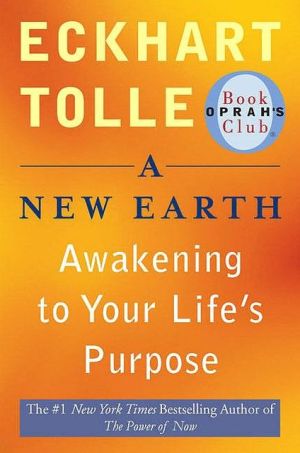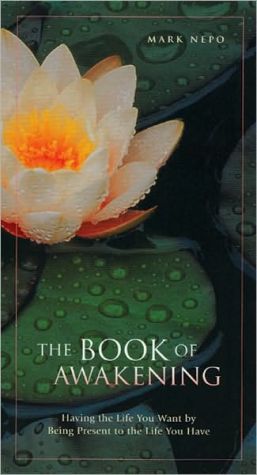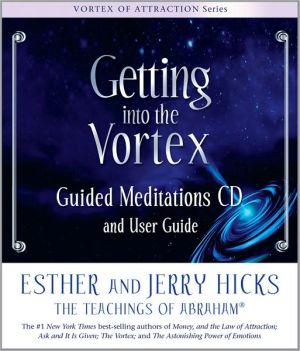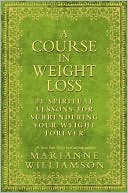A New Earth: Awakening to Your Life's Purpose
Building on the astonishing success of The Power of Now, Eckhart Tolle presents readers with an honest look at the current state of humanity: He implores us to see and accept that this state, which is based on an erroneous identification with the egoic mind, is one of dangerous insanity.\ Tolle tells us there is good news, however. There is an alternative to this potentially dire situation. Humanity now, perhaps more than in any previous time, has an opportunity to create a new, saner, more...
Search in google:
Building on the astonishing success of The Power of Now, Eckhart Tolle presents readers with an honest look at the current state of humanity: He implores us to see and accept that this state, which is based on an erroneous identification with the egoic mind, is one of dangerous insanity.Tolle tells us there is good news, however. There is an alternative to this potentially dire situation. Humanity now, perhaps more than in any previous time, has an opportunity to create a new, saner, more loving world. This will involve a radical inner leap from the current egoic consciousness to an entirely new one.In illuminating the nature of this shift in consciousness, Tolle describes in detail how our current ego-based state of consciousness operates. Then gently, and in very practical terms, he leads us into this new consciousness. We will come to experience who we truly are--which is something infinitely greater than anything we currently think we are--and learn to live and breathe freely. Publishers Weekly According to Tolle, who assumes the role of narrator as well, humans are on the verge of creating a new world by a personal transformation that shifts our attention away from our ever-expanding egos. This idea is well realized through Tolle's remarkably well-paced narration. Naturally, the author understands his material so thoroughly that he is able to convey it in an enjoyable manner, but Tolle's gentle tone and dialect begs his audience's attention simply through its straightforward approach. Something about this reading just seems profoundly important, whether one agrees with the material or not, and listeners' attention is sure to be captured within seconds of listening to Tolle's take on the universe in which we live. Originally released in 2005, both book and audiobook were reissued when Oprah Winfrey chose the title for her book club this year. A Penguin paperback. (Feb.)Copyright © Reed Business Information, a division of Reed Elsevier Inc. All rights reserved.
The Flowering of Human Consciousness\ Evocation\ Earth, 114 million years ago, one morning just after sunrise: The first flower ever to appear on the planet opens up to receive the rays of the sun. Prior to this momentous event that heralds an evolutionary transformation in the life of plants, the planet had already been covered in vegetation for millions of years. The first flower probably did not survive for long, and flowers must have remained rare and isolated phenomena, since conditions were most likely not yet favorable for a widespread flowering to occur. One day, however, a critical threshold was reached, and suddenly there would have been an explosion of color and scent all over the planet—if a perceiving consciousness had been there to witness it.\ Much later those delicate and fragrant beings we call flowers would come to play an essential part in the evolution of consciousness of another species. Humans would increasingly be drawn to and fascinated by them. As the consciousness of human beings developed, flowers were most likely the first thing they came to value that had no utilitarian purpose for them, that is to say, was not linked in some way to survival. They provided inspiration to countless artists, poets, and mystics. Jesus tells us to contemplate the flowers and learn from them how to live. The Buddha is said to have given a "silent sermon" once during which he held up a flower and gazed at it. After a while, one of those present, a monk called Mahakasyapa, began to smile. He is said to have been the only one who had understood the sermon. According to legend, that smile (that is to say, realization) was handed down by twenty-eight successive masters and much later became the origin of Zen.\ Seeing beauty in a flower could awaken humans, however briefly, to the beauty that is an essential part of their own innermost being, their true nature. The first recognition of beauty was one of the most significant events in the evolution of human consciousness. The feelings of joy and love are intrinsically connected to that recognition. Without our fully realizing it, flowers would become for us an expression in form of that which is most high, most sacred, and ultimately formless within ourselves. Flowers, more fleeting, more ethereal, and more delicate than the plants out of which they emerged, would become like messengers from another realm, like a bridge between the world of physical forms and the formless. They not only had a scent that was delicate and pleasing to humans, but also brought a fragrance from the realm of spirit. Using the word "enlightenment" in a wider sense than the conventionally accepted one, we could look upon flowers as the enlightenment of plants.\ Any life-form in any realm—mineral, vegetable, animal, or human—can be said to undergo "enlightenment." It is, however, an extremely rare occurrence since it is more than an evolutionary progression: It also implies a discontinuity in its development, a leap to an entirely different level of Being and, most importantly, a lessening of materiality.\ What could be heavier and more impenetrable than a rock, the densest of all forms? And yet some rocks undergo a change in their molecular structure, turn into crystals, and so become transparent to the light. Some carbons, under inconceivable heat and pressure, turn into diamonds, and some heavy minerals into other precious stones.\ Most crawling reptilians, the most earthbound of all creatures, have remained unchanged for millions of years. Some, however, grew feathers and wings and turned into birds, thus defying the force of gravity that had held them for so long. They didn't become better at crawling or walking, but transcended crawling and walking entirely.\ Since time immemorial, flowers, crystals, precious stones, and birds have held special significance for the human spirit. Like all life-forms, they are, of course, temporary manifestations of the underlying one Life, one Consciousness. Their special significance and the reason why humans feel such fascination for and affinity with them can be attributed to their ethereal quality.\ Once there is a certain degree of Presence, of still and alert attention in human beings' perceptions, they can sense that there is more there than the mere physical existence of that form, without knowing that this is the reason why he or she is drawn toward it, feels an affinity with it. Because of its ethereal nature, its form obscures the indwelling spirit to a lesser degree than is the case with other life-forms. The exception to this are all newborn life-forms—babies, puppies, kittens, lambs, and so on. They are fragile, delicate, not yet firmly established in materiality. An innocence, sweetness and beauty that are not of this world still shine through them. They delight even relatively insensitive humans.\ So when you are alert and contemplate a flower, crystal, or bird without naming it mentally, it becomes a window for you into the formless. There is an inner opening, however slight, into the realm of spirit. This is why these three "en-lightened" life-forms have played such an important part in the evolution of human consciousness since ancient times; why, for example, the jewel in the lotus flower is a central symbol of Buddhism and a white bird, the dove, signifies the Holy Spirit in Christianity. They have been preparing the ground for a more profound shift in planetary consciousness that is destined to take place in the human species. This is the spiritual awakening that we are beginning to witness now.\ The Purpose of This Book\ Is humanity ready for a transformation of consciousness, an inner flowering so radical and profound that compared to it the flowering of plants, no matter how beautiful, is only a pale reflection? Can human beings lose the density of their conditioned mind structures and become like crystals or precious stones, so to speak, transparent to the light of consciousness? Can they defy the gravitational pull of materialism and materiality and rise above identification with form that keeps the ego in place and condemns them to imprisonment within their own personality?\ The possibility of such a transformation has been the central message of the great wisdom teachings of humankind. The messengers—Buddha, jesus, and others, not all of them known—were humanity's early flowers. They were precursors, rare and precious beings. A widespread flowering was not yet possible at that time, and their message became largely misunderstood and often greatly distorted. It certainly did not transform human behavior, except in a small minority of people.\ Is humanity more ready now than at the time of those early teachers? Why should this be so? What can you do, if anything, to bring about or accelerate this inner shift? What is it that characterizes the old egoic state of consciousness recognized? These and other essential questions will be addressed in this book. More important, this book itself is a transformational device that has come out of the arising new consciousness. The ideas and concepts presented here may be important, but they are secondary. They are no more than signposts pointing toward awakening. As you read, a shift takes place within you.\ This book's main purpose is not to add new information or beliefs to your mind or to try to convince you of anything, but to bring about a shift in consciousness, that is to say, to awaken. In that sense, this book is not "interesting." Interesting means you can keep your distance, play around with ideas and concepts in your mind, agree or disagree. This book is about you. It will change your state of consciousness or it will be meaningless. It can only awaken those who are ready. Not everyone is ready yet, but many are, and with each person who awakens, the momentum in the collective consciousness grows, and it becomes easier for others. If you don't know what awakening means, read on. Only by awakening can you know the true meaning of that word. A glimpse is enough to initiate the awakening process, which is irreversible. For some, that glimpse will come while reading this book. For many others who may not even have realized it, the process has already begun. This book will help them recognize it. For some, it may have begun through loss or suffering; for others, through coming into contact with a spiritual teacher or teaching, through reading The Power of Now or some other spiritually alive and therefore transformational book—or any combination of the above. If the awakening process has begun in you, the reading of this book will accelerate and intensify it.\ An essential part of the awakening is the recognition of the unawakened you, the ego as it thinks, speaks, and acts, as well as the recognition of the collectively conditioned mental processes that perpetuate the unawakened state. That is why this book shows the main aspects of the ego and how they operate in the individual as well as in the collective. This is important for two related reasons: The first is that unless you know the basic mechanics behind the workings of the ego, you won't recognize it, and it will trick you into identifying with it again and again. This means it takes you over, an imposter pretending to be you. The second reason is that the act of recognition itself is one of the ways in which awakening happens. When you recognize the unconsciousness in you, that which makes the recognition possible is the arising consciousness, is awakening. You cannot fight against darkness. The light of consciousness is all that is necessary. You are that light.
The Flowering of Human Consciousness 1Evocation 1The Purpose of This Book 5Our Inherited Dysfunction 8The Arising New Consciousness 13Spirituality and Religion 17The Urgency of Transformation 20A New Heaven and a New Earth 23Ego: The Current State of Humanity 25The Illusory Self 27The Voice in the Head 30Content and Structure of the Ego 34Identification with Things 35The Lost Ring 38The Illusion of Ownership 42Wanting: The Need for More 46Identification with the Body 49Feeling the Inner Body 52Forgetfulness of Being 53From Descartes's Error to Sartre's Insight 54The Peace That Passes All Understanding 56The Core of Ego 59Complaining and Resentment 61Reactivity and Grievances 64Being Right, Making Wrong 66In Defense of an Illusion 67Truth: Relative or Absolute? 69The Ego Is Not Personal 72War Is a Mind-set 74Do You Want Peace or Drama? 77Beyond Ego: Your True Identity 77All Structures Are Unstable 79The Ego's Need to Feel Superior 81Ego and Fame 82Role-playing: The Many Faces of the Ego 85Villain, Victim, Lover 87Letting Go of Self-Definitions 89Pre-established Roles 90Temporary Roles 93The Monk with Sweaty Palms 94Happiness as a Role Vs. True Happiness 95Parenthood: Role or Function? 97Conscious Suffering 101Conscious Parenting 103Recognizing Your Child 104Giving Up Role-playing 106The Pathological Ego 109The Background Unhappiness 112The Secret of Happiness 114Pathological Forms of Ego 118Work-With and Without Ego 121The Ego in Illness 124The Collective Ego 125Incontrovertible Proof of Immortality 127The Pain-Body 129The Birth of Emotion 131Emotions and the Ego 134The Duck with a Human Mind 137Carrying the Past 139Individual and Collective 141How the Pain-Body Renews Itself 144How the Pain-Body Feeds on Your Thoughts 145How the Pain-Body Feeds on Drama 148Dense Pain-Bodies 151Entertainment, the Media, and the Pain-Body 152The Collective Female Pain-Body 154National and Racial Pain-Bodies 157Breaking Free 161Presence 164The Return of the Pain-Body 167The Pain-Body in Children 169Unhappiness 172Breaking Identification with the Pain-Body 174"Triggers" 177The Pain-Body as an Awakener 180Breaking Free of the Pain-Body 183Finding Who You Truly Are 185Who You Think You Are 186Abundance 190Knowing Yourself and Knowing About Yourself 192Chaos and Higher Order 194Good and Bad 195Not Minding What Happens 198Is That So? 199The Ego and the Present Moment 200The Paradox of Time 204Eliminating Time 206The Dreamer and the Dream 208Going Beyond Limitation 210The Joy of Being 213Allowing the Diminishment of the Ego 214As Without, So Within 217The Discovery of Inner Space 223Object Consciousness and Space Consciousness 227Falling Below and Rising Above Thought 229Television 230Recognizing Inner Space 233Can You Hear the Mountain Stream? 236Right Action 238Perceiving Without Naming 239Who Is the Experiencer? 241The Breath 243Addictions 246Inner Body Awareness 248Inner and Outer Space 250Noticing the Gaps 253Lose Yourself to Find Yourself 254Stillness 255Your Inner Purpose 257Awakening 259A Dialogue on Inner Purpose 262A New Earth 279A Brief History of Your Life 282Awakening and the Return Movement 284Awakening and the Outgoing Movement 288Consciousness 291Awakened Doing 293The Three Modalities of Awakened Doing 295Acceptance 296Enjoyment 297Enthusiasm 301The Frequency-holders 306The New Earth Is No Utopia 307Notes 311About the Author 315
\ From Barnes & NobleSpiritual teacher Eckhart Tolle's first full-length book in eight years addresses the collective dysfunction that characterizes the present state of humanity. According to the author of The Power of Now, our identification with the "egoic mind" imperils the future of life on our planet. But there is, Tolle insists, an alternative to this dire outcome. In A New Earth, he describes a shift that allows an intelligence far greater than the ego's to operate.\ \ \ \ \ Publishers WeeklyAccording to Tolle, who assumes the role of narrator as well, humans are on the verge of creating a new world by a personal transformation that shifts our attention away from our ever-expanding egos. This idea is well realized through Tolle's remarkably well-paced narration. Naturally, the author understands his material so thoroughly that he is able to convey it in an enjoyable manner, but Tolle's gentle tone and dialect begs his audience's attention simply through its straightforward approach. Something about this reading just seems profoundly important, whether one agrees with the material or not, and listeners' attention is sure to be captured within seconds of listening to Tolle's take on the universe in which we live. Originally released in 2005, both book and audiobook were reissued when Oprah Winfrey chose the title for her book club this year. A Penguin paperback. (Feb.)\ Copyright © Reed Business Information, a division of Reed Elsevier Inc. All rights reserved.\ \ \ Library JournalTolle follows up his successful The Power of Now-it's sold two million copies worldwide since 1997-with a plea to reject egotistic ways for a new form of consciousness. Copyright 2005 Reed Business Information.\ \ \ \ \ Library JournalTolle, author of The Power of Now, shows here in this book, touted by Oprah Winfrey, how transcending the needs of the self might help not only us but our world.\ \








